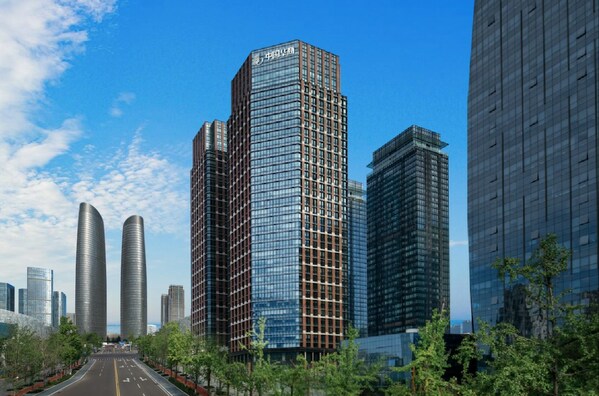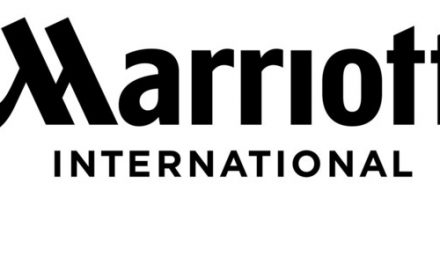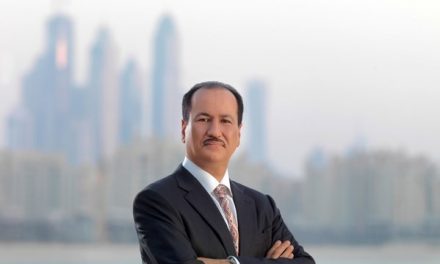CHENGDU, China, Jan. 8, 2024 /PRNewswire/ — The core structures of the Huashang-Jinjiang Office Building Project, a development by Huaqiao Fenghuang Group in Chengdu, China, have recently reached completion, marking another iconic landmark in the Jinjiang district.
In the third phase of Chengdu Financial City, the buildings constructed on the 70 mu (approx. 4.68 hectares) of land features an aggregate 210,000 square meters of office space. The project includes two Grade A and six stand-alone office buildings. Huaqiao Fenghuang Group, with its international perspective, seeks to offer refined and exclusive headquarters for multinational corporations.
Raising the Industry Benchmark Through a 5 Billion Yuan Investment
The Huashang-Jinjiang Project, officially termed the Huaqiao Fenghuang Urban Industry International Innovation Port project, is situated in the third phase of Chengdu Financial City. Its unique location adjacent to Jinjiang Avenue provides easy access to Jinjiang Public Service Center and Metro Line 6’s Jinshi Road Station.
In 2021, Huaqiao Fenghuang Group signed on to the project committing to an investment of approximately 5 billion yuan. The development, to be built on 70.24 mu (4.685 hectares) of industrial land in Huaqiao Xinyuan, is poised to become a significant office building landmark of the third phase of Chengdu Financial City.
Upon completion, the stand-alone headquarters office building will feature three above-ground floors, encompassing approximately 1,700 square meters. The interior layout of each floor is customizable to meet client specifications. Each of the two towers boasts a 2,000-square-meter, 14-meter high lobby and 1,700-square-meter single floor office spaces equipped with hardware facilities that meet Super Grade A standards.
The project will include a 1,600-square-meter column-free multipurpose hall designed to accommodate international events, a specialty supermarket, a boutique coffee shop, and a high-end gym. These amenities are tailored to offer comprehensive support services for the headquarters of multinational companies. Completion of the project is anticipated by the end of this year or early next year.
Being a Long-Termist in Chengdu’s Real Estate Market
Huaqiao Fenghuang Group has garnered much attention as the developer behind the highly regarded Chinese Financial Center and Jiaozi Mansion in the Jiaozi business district of Chengdu Financial City. The developer has earned an influential reputation in the city’s property market due to its championing of long-term values.
The group is a substantial multinational conglomerate with interests in six key sectors: modern agriculture, industrial manufacturing, real estate, commerce, finance, and international investment and trade.
With a focus on international development, the group has adopted a strategy emphasizing steady progress over rapid expansion. The firm’s portfolio includes real estate investments and development projects in over 20 countries and regions, including residential, commercial, and office properties.
Over a decade ago, the group made its foray into Chengdu with the unveiling of the 212 mu (14.1-hectare) Huaqiao Fenghuang International City, a residential development situated on Wangcong Road in Chengdu Hi-Tech Industrial Development Zone’s western district.
Nevertheless, the project that truly established the group’s prominence is the Chinese Financial Center. The 380,000-square meter complex combines dining venues, residences, apartments, and office spaces. Situated next to the twin towers of Chengdu Financial City, it features a classic stone façade in maple leaf red, distinguishing it as an iconic landmark in the southern part of the city.
Chinese Financial City is positioned to become a premier international culinary hub in southern Chengdu. Open for over a year, the six-story, 150,000-square meter venue boasts an occupancy rate exceeding 90% and features nearly 100 food establishments. The roster of restaurants include more than ten Michelin- and Black Pearl-rated restaurants, many of which are the first in the area to offer their specific type of cuisine.
For its apartment complex, Jiaozi Mansion, the developer has embraced a unique sales strategy focused on choosing owners who align with a philosophy of fostering a community of considerate and compatible residents. The distinctive approach has contributed to the intrigue surrounding the project, which continues to report robust sales figures.
Rejuvenating the City with 3 Real Estate Projects
Beyond the Huashang-Jinjiang project, there are two additional projects representing considerable investments.
The Huashang-Rosa Royale, situated at No. 8 Gaopeng Avenue, once served as the headquarters of the group and remains its registered address.
Echoing the design of the Chinese Financial Center, the project showcases a maple leaf red color scheme and an extensive glass façade. The 15-story building comprises 84 units, varying from 253 to 510 square meters in size. Each unit is designed with a single staircase and intended for single-family use.
Rosa Royale stands apart from conventional lofts, which typically exceed 200 square meters and must accommodate two staircases and two households. In contrast, the residential complex features a unique partitioned layout with a single staircase, purpose-built for single-family occupancy. The design underscores a commitment to customer privacy and optimized space utilization.
Defined as a “private customized residence”, the project offers 12 different layouts catering to diverse customer preferences. Penthouse units feature six-meter indoor ceilings, creating an impressive, spacious ambiance.
Complementing its exceptional amenities, the project extends access to international-grade elite concierge services from Chinese Financial Center and Huashang VIP services.
Jiaozi Mansion, already a well-known Chengdu landmark, will become part of the Chinese Financial Center. The center has been open for over a year and offers apartments ranging from 121 to 186 square meters in size.
The simultaneous roll out of the three significant projects, offering garden-style headquarters offices alongside living quarters and apartments meeting the expectations of expatriate families, is certain to draw the attention of multinational firms looking to relocate their headquarters. It will be of utmost interest to see how these real estate developments perform in the market.





